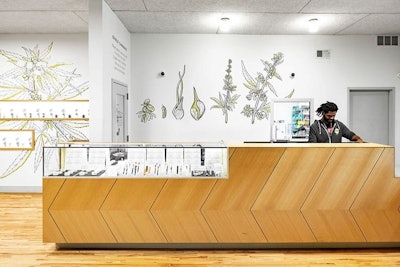
If you want to build a company that offers customers a special kind of experience, you need to hire a special group of employees. The way a company cares for its employees can translate to how its customers are treated as well.
To ensure that every employee at Dispensary 33 is cut out to offer the high standard of personalized customer service that co-owners and brothers Zachary and Bryan Zises envisioned from the beginning, each staff member undergoes an extensive vetting and training process, specifically designed to prepare them to work in what can be both a challenging and very rewarding environment.
The company seeks out employees who already have the right personality and drive to succeed in their roles but not necessarily those with a wealth of insider knowledge about the cannabis industry. It is those types of employees who tend to be best suited to the company’s dual business model—serving both the medical and adult-use market segments—and who tend to stick around longer as they find fulfillment in their work.
“Personality and passion for the plant is more important than previous knowledge to us,” CEO Zachary Zises says. “We train our staff in-house. We look at how they approach life and how they draw upon things learned from past experiences when finding suitable candidates for employees. The truth is, most people don't have prior experience, and if they do it's from vastly different states and markets.”
The customer service staff has been tasked with ensuring every person to enter the dispensary since its debut as Chicago’s first medical cannabis storefront in 2015, is treated with respect and compassion.
Once inside the actual dispensary, and in the lobby before that, staffers make sure medical patients have priority in line.
The company also uses technology to avoid allowing the integration of the adult-use market into the company’s business model to increase wait times.
“We implemented an online system for recreational customers to reserve a time slot and pre-order, which significantly decreases wait times,” Zises says.
Personality Trumps Knowledge
One of the goals of dispensary employees is to take first-time customers from newbie to expert. They take the time to answer customer questions and fully understand their situation and needs.
Zises described the ultra-personalized business model he and his brother developed at Dispensary 33 as one that offers the type of customer experience they would want for themselves. To pull it off, they needed the right people to provide the right level of customer attention.
“We certainly try to hire staff who will thrive at the demands of the job—a lot of cannabis information retention, a passion for the product, and a desire to work one-on-one with people all day long,” Zises says.

The clientele at Dispensary 33 includes people with varied levels of familiarity with cannabis products who purchase them for a wide range of uses. The company integrated the new adult-use market segment after the state of Illinois approved the sale of cannabis for recreational use in June 2019.
If finding people who are driven and knowledgeable about cannabis were not enough of a challenge, it is essential for Dispensary 33 employees to have a good bedside manner, especially when working with patients coping with any number of ailments and the resulting symptoms.
“Sometimes we’re working with people in a lot of pain, or who have received terminal illness diagnoses,” Zises says. “These are difficult interactions and you need to have the right mindset and personality to make these experiences as positive as possible so that staff can walk away more with a sense of fulfillment than feeling beaten down by them.”
Knowing that such difficult interactions will be occurring frequently has led Dispensary 33 to believe that personality and attitude are the most important attributes to look for when making hiring decisions.
Because of the company’s extensive training regimen, employees generally are well equipped to identify each customer’s needs without intruding on their legal right to privacy under HIPAA (the Health Insurance Portability and Accountability Act).
“We are predominantly treating symptoms and, because of the safety profile of cannabis, do not tend to have to get into drug interaction contraindications,” Zises says. “So, a purchaser tells us what symptoms they are looking to treat, and what side effects they are looking to either prevent or promote, and that's almost always enough information for us to make good recommendations.”
Zises and his associates don’t want their medical clients to have to worry about the rolls of legal red tape facing the cannabis industry. So they make a point to ensure that staffers are able to put any and all concerns they may have to rest.
“We wanted the regulatory requirements to be as invisible to the purchaser as possible, and we wanted staff who were so thoroughly trained that they could provide each purchaser with an experience and product recommendations that were as close to ideal as possible,” Zises says.
Cannabis Compassion Program
Understanding the financial hardship enduring by those living with chronic illnesses, Dispensary 33 created the Cannabis Compassion Program, through which the business donates at least 1% of its sales revenue to economically distressed patients, free of charge.
“All of our employees are super passionate about what they do,” Zises says. “Living with a chronic illness is a huge financial burden, so seeing firsthand how D33's Cannabis Compassion Program affects people's lives can be very fulfilling.”
The program was modeled after a similar one run by the California-based Berkeley Patients Group dispensary. That initiative, called the Helping Hands Program, has been benefiting patients since the business launched in 1999.
RELATED: Berkeley Patients Group Turns 20: Compassionate Beginnings
“Our original application for the dispensary license included the Cannabis Compassion Program, and we instituted it the day we opened,” Zises says. “There were 12 patients in the first round in 2015 and we now support 20-plus patients per cycle.”
To qualify for the program, patients must be continuously registered customers for at least 120 days and demonstrate their need for assistance, including by showing that they are living below the poverty line and/or receive SNAP or Medicaid benefits.
“We've expanded the Cannabis Compassion Program over the years and currently give away close to $57,000 annually to patients in financial distress,” Zises says, noting that every patient receives $240 of store credit every month.
Awardees must wait a year following the end of their award cycle before they can reapply, Zises says. The waitlist often is one to two cycles long – meaning patients can usually get back in the program within a couple of years.

Retaining Business, Employees Through Challenges
It is no secret that quality customer service often leads to repeat business. It’s also not rocket science that employees who find fulfillment in their work tend to be prone to stay on the payroll longer than those who don’t. The Dispensary 33 model appeals to both schools of thought.
“Every long-time employee at the shop will have dozens of stories of taking a purchaser from noob to connoisseur, from first-time user undergoing chemo[therapy] to someone who expertly knows how to titrate their cannabis doses, across multiple intake types, to address their needs from hour to hour and day to day,” Zises says. “These experiences are the core of what we do.”
The often impersonal, technology-driven world inevitably has given rise to the number of customers who actually may prefer the big-box-store, one-size-fits-all approach to customer service. Zises recognizes this and says he’s okay with it.
“It’s a given that some purchasers are going to groove to what we do and some aren't. We shy away from a quant-driven decision-making process,” Zises said. “We’re not trying to be Walmart – we’re trying to have a shop that we love and hope that purchasers respond to that.”
Looking out for the well-being of customers and employees alike remains a top priority for Dispensary 33 – a fact that is perhaps more appreciated than ever given the impact of the COVID-19 pandemic.
In Illinois, state-licensed cannabis growers and retailers were considered “essential” under Gov. J.B. Pritzker’s stay-at-home order. With that being the case, Zises said Dispensary 33 will remained open but also continues to help patients remotely.
“We do help patients via email or through direct message on our social media platforms,” Zises said. “We also do in-depth research, look at lab results and test products to write in-house descriptions for each product on our menu.”
The coronavirus situation has put a damper on any plans for new innovations in the short-term, so Dispensary 33’s founders are simply focusing on continuing to concern themselves with the same things they always have – the well-being of their customers and their employees.
“Our only innovation into the foreseeable future is working to stay operational while keeping our purchasers and staff safe,” Zises said.
That philosophy has served the Zises’ well thus far and there seems to be no reason for them to look to deviate from it anytime soon.
Robert has worked as a professional journalist since January 2012. He covered local sports, politics and events for the Sun Newspapers and Cleveland.com before transitioning to trade publications and later public relations.

























